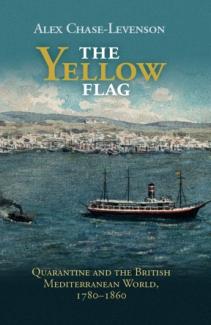
Epidemic diseases are terrifying. So, to many, are quarantines. Forcibly ordering people to withdraw from the rhythms of everyday life seems at once intrusive and extraordinary. A quarantine of two weeks can appear almost unfathomable in an age when no point in the globe is farther than 25 hours away by air. Many have argued that quarantines may actually exacerbate the severity of epidemics like coronavirus and that the restrictions they place on movement are an outlandish reversion to a barbaric policy. Perhaps the way we talk about quarantine encourages this sense.
After all, part of the point of the practice is to appear total and absolute. Historically, quarantine has been something people “perform,” and its drama has always been part of its appeal. The news coverage of the quarantines and isolation orders issued in response to Covid-19 certainly has proceeded in a dramatic vein. The Chinese government’s enclosure of much of Hubei province and the proscriptions against travel out of the area have elicited assessments that this is the largest application of quarantine in history, while the placing of much of Northern Italy on “lock-down” status seems almost as unprecedented.
Yet, there are historical precedents of quarantine systems that, in terms of geography and longevity, were larger still. My book, coming out this spring, is called The Yellow Flag: Quarantine and the British Mediterranean World. It explores a massive quarantine system that existed until the mid-nineteenth century, which ensnared every single person, ship, letter, or trade good moving across the Middle Sea from the Ottoman Empire and other parts of North Africa to Western Europe.
This system was an institutional response to an epidemiological imbalance, in which bubonic plague epidemics periodically struck Ottoman port cities long after the last major outbreaks of plague in Western Europe. During its operation, however, the vast majority of ships proceeded to Europe from Middle Eastern ports with no reports of disease.
Quarantine affected every traveler crossing the Mediterranean. What mattered, at this time, was where you came from, not who you were (a crucial distinction lost in later, more discriminatory applications of quarantine). In fact, most of those quarantined in the Mediterranean at this time were themselves Western European sailors, fishermen, tourists, diplomats, missionaries, or merchants returning home (including eighteenth and nineteenth-century celebrities like Jean-Jacques Rousseau, Lord Byron, William Thackeray, and Benjamin Disraeli).
All told, the Mediterranean quarantine system detained close to 100,000 people each year during the first half of the nineteenth century. Though few passengers held in lazarettos ever developed diseases, health boards not only continued to apply quarantine laws but actually threatened to detain ships arriving from any state that contemplated relaxing the rules. Faced with a crisis like coronavirus, members of a Mediterranean health board would have thought it necessary to quarantine every traveler from any affected country and every traveler from every country that did not have such a quarantine: a tall order in a world with a much, much higher volume of trade and travel!
Even at the time, administering quarantine was a challenge, but the low-level bureaucrats on health boards communicated with each other regularly and built a shared, transnational border from the ground up. This set a precedent for medical collaboration that led directly to the first International Sanitary Conferences and the development of international health as a field.
The results of this system, then, were complex. Many were detained in an apparent overreaction to disease—the sea voyages across the Mediterranean alone exceeded the incubation period of the plague. The tradition of associating “the East” with disease has helped foster enduring stigmas. Yet, whether or not it was partially responsible for eliminating bubonic plague in Europe, in terms of contributing to the development of public health reform and facilitating the creation of new international health authorities, this universal quarantine had some positive results too.
Can we draw lessons from this historical experience? Surely, we should insist on the importance of nuance. Quarantine is not always outlandish and regressive, but it can certainly help undergird destructive stereotypes. It has historically been the least effective when it was targeted to certain categories of individuals.
While quarantines seem draconian, they have long been employed by relatively democratic governments, over the protests of those subjected to them. In the US, as elsewhere, the extensive power the government has to quarantine citizens has venerable precedents. And in the past that I study, quarantine was a regular, even routine part of traveling, not an extraordinary event.
Pandemics may become increasingly common, and if quarantines become routine again, we should all hope they are conducted humanely and applied without discrimination. We should learn from the past that while quarantines and isolation regimes can be somewhat effective as one part of a prophylactic arsenal, they will be useless if they are not accompanied by robust public health funding and other tools. If quarantines do once again become an enduring feature of travel, we should learn from the travelers I study that the time goes much more quickly if you pack good books. And maybe before we get to that point, some books about epidemics in the past? Nancy Bristow’s American Pandemic, Mark Harrison’s Contagion, and Albert Camus’s short novel The Plague are a few good ones to start with.
